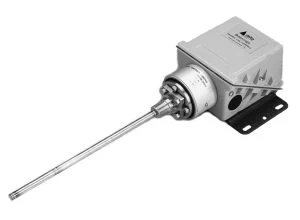The model S71 Temperature Switch comes with a rigid or semi-rigid thermal system and is suitable for setpoints between -40°C and +260°C with maximum working temperatures up to 270°C. The Industrial Series switches were developed in the mid-1990’s to offer customers a robust range of switches suitable for applications where requirements were more standard than those for which the highly configurable Performance Series temperature switches were designed.
Using diaphragm based sensors and a more traditional in-line force balance mechanism to transfer movement from the sensor to the microswitch, these switches are suitable for a wide range of industrial applications. Various international approvals make the Industrial Series suitable for use in both safe and Hazardous Areas in Europe, North America and throughout the world.
With the recent launch of the Sentry Series, these Industrial models are now recommended mainly for aftermarket applications where a like for like replacement is needed.
- Epoxy coated aluminium or stainless steel housings approved to IP66 and NEMA 4X
- SPDT and DPDT switch contacts with environmentally and hermetically sealed options
- Stainless steel wetted parts as standard
- Better than 1% set-point repeatability
- Temperatures ranges from -40°C and +260°C
- Tmax up to 270°C depending on range
Features:
- Weatherproof and Flameproof models ATEX and NEC 500
- 316 stainless steel capillary and bulb.
- Ranges available up to 160 to 260°C (320 to 500°F).
- Maximum working temperature up to 270°C (518°F).
- Field set point adjustment against a reference scale.
- Hermetically sealed microswitch options.
- Optional gold alloy contacts.
- Terminal block for easy field wiring.
- Safety vented design as standard
Advantages:
Better than 1% set-point repeatability
Users can expect a set-point repeatability performance better than 1% on all configurations with some configurations being significantly better
Extensive range of approvals
The Industrial Series switches are available with wide range of different approvals including European and North American Hazardous Area approvals
Safety
All Industrial Series models come with a safety vent to prevent the enclosure becoming pressurized in the event that the sensor is inadvertently damaged by excessive pressure. In addition, all models have been certified for use in safety systems up to and including SIL 2.
Application:
The S71 Industrial Series is suitable for a wide range of applications in:
- Oil & Gas
- Chemical
- Petrochemical
- Refining
- Power
- OEM
The choice of models available ensures that the S71 Industrial Series is suitable for use in:
- Corrosive atmospheres
- Resistant to chemical attack
Specification:
Accuracy: Set point repeatability ± 1% of span at 20°C / 68°F ambient.
Storage Temperature: -25 to +60°C / -13 to +140°F
Ambient Temperature: -25 to +60°C / -13 to +140°F
Maximum Process Temperature: Subject to appropriate installation practice, the component parts withstand up to +60°C (+140°F). For higher temperatures, refer to SPECIAL ENGINEERING.
Maximum Working Pressure: System sensing probes for both the capillary and rigid stem version are designed to withstand 100 bar (1500 psi) without a thermowell.
Enclosure classification: IP66 / NEMA 4X / Flameproof Ex d.
Switch output:
- SPDT or DPDT snap action microswitch (standard).
- Hermetically sealed (optional).
Process Connection: 3/8 NPT External Sliding Gland, 1/2 NPT External Direct Mounting. Approximate Weight: Enclosures: "H & T" 2.6kg/5.7lb; "R & U" 7.1kg/15.6lb; "W" 2.6kg/5.7lb; "A" 3.9kg/8.6lb.
Download Data Sheet: Temperature Switches S71 Series
Ref: delta-mobrey.com
Another Article:
Neo-Dyn 100P Series Pressure Switch/Internal Adjusment
ITT Neo-Dyn 162P Series Differential Pressure Switch
Wingle Magnetic Flow Cable Level Switch VCFP Series
Temperature Switch 772 Series Delta Mobrey
Temperature Switch 734 Series Delta Mobrey


Komentar
Posting Komentar
Informasi Pilihan Identitas:
Google/Blogger : Khusus yang punya Account Blogger.
Lainnya : Jika tidak punya account blogger namun punya alamat Blog atau Website.
Anonim :